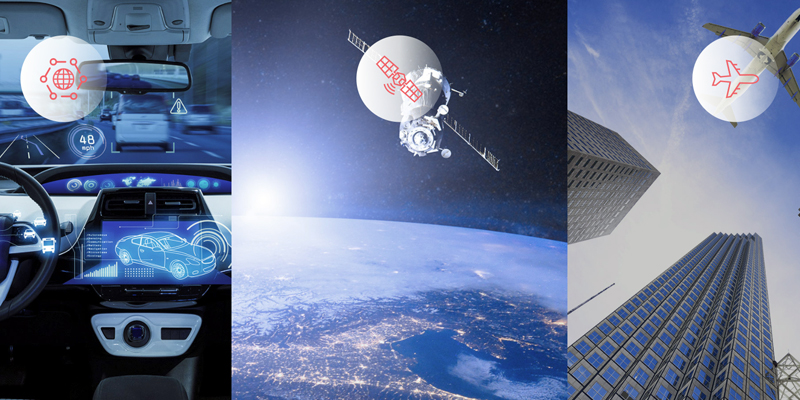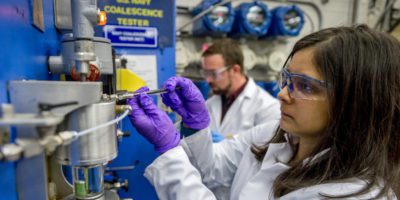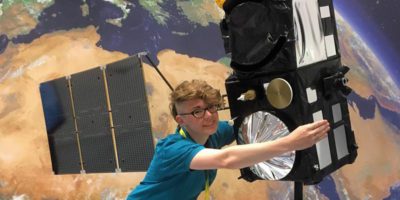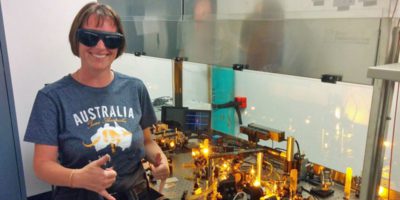Dr Craig Brown is vice president of major programmes for SatixFy, a satellite communications company disrupting the economics of space through new low-cost antenna technology. Craig studied at the University of Leicester, before spending six months on a traineeship at the European Space Agency and then going on to study for his PhD back in Leicester. He then spent six years working for Airbus and five years at Innovate UK, and also took the lead on diversity activity for the Space Skills Advisory Panel, working with a small team to ensure that the development of the space skills pipeline keeps equity, diversity and inclusion (EDI) at its heart.
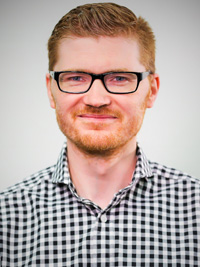
“None of the diversity categories are discrete and separate from each other. They intersect. In reality, many people will fall into multiple categories and there are an infinite number of life experiences that we try to capture when partitioning EDI as we do. Life isn’t neat and ordered into EDI categories and to treat diversity in a non-intersectional way would be an oversimplification that would hamper our attempt to improve our sector.”
Being a Womanthology ‘regular’
It’s great to be asked to contribute to Womanthology again! I love the space issue, so thank you for inviting me!
I’m a first-generation graduate in my family and attended a comprehensive school in South Wales. My space career has been a bit meandering, starting when I studied Physics with Space Science and Technology at the University of Leicester. After graduation, I was lucky enough to land a traineeship at the European Space Agency (after six months of job-seekers allowance!) where I spent a year and a half working in the Netherlands. Then back to Leicester to do my PhD in space instrumentation for three years, after which I jumped straight into a job in industry.
I spent six years working for the space part of Airbus, designing new space science and exploration missions, after which I joined the UK government’s innovation agency, Innovate UK. I spent five years at Innovate UK as the innovation lead for space. I left there just under two years ago, returning back to the space industry, where I’ve joined a small and growing company called SatixFy, as their vice president for major programmes.
The importance of strong relationships
It’s tricky to explain how I spent my time because no two days are the same! I have a broad remit at the company but my job is predominantly in business development, rather than on the technical side of things.
SatixFy is a super-interesting company and has invented some amazing and strategically important technology. We make a range of products based on flat-panel electronically steered multi-beam antennas, used on the ground, on aeroplanes and on satellites. It’s a real game-changer technology.
Our system on a plane will allow commercial passengers to get proper broadband Internet during a flight, for example, rather than the dial-up style connections you get at the moment. I am responsible for managing company relationships with government departments, space agencies, customers, investors … my diverse work experience means I am pretty good at dealing with different types of organisations and people.
Alongside my SatixFy role, I have been working with the UK Space Agency, UK Space, the UK space industry trade body, and various academic partners. I lead the diversity activity for the Space Skills Advisory Panel, working with a small team to ensure that, as we address our sector’s skills pipeline, we do it in a way that keeps equity, diversity and inclusion (EDI) at its heart.
Juggling the stresses of work and home during the pandemic
COVID-19 has been a real challenge, both from a business and personal perspective. SatixFy was working very closely with a large space company called OneWeb which went bankrupt in the first week of the COVID lockdown. It meant that a significant amount of investment that we were due to receive disappeared overnight. My first few months were spent trying to fill that funding gap, securing the future of the company. It was a super stressful time. I’m very happy to say that the company has come through the pandemic stronger than it went in, growing in size and launching new products.
On a personal level, the last 12 months have been tough. I lost my grandmother at the start of the pandemic, and the rest of my family in south Wales caught the virus at the start of the second wave. My mother was hospitalised for the best part of a month. It was touch-and-go for a good while, but thankfully she pulled through and is now well. Juggling the stresses of work and home over the last year has been hard – true for us all, I’m sure!
Undertaking a Space Census to learn more about diversity in the space sector
The work I’ve been doing on diversity for the Space Skills Advisory Panel is such an important activity. EDI is a vital part of making sure we capture and retain the best talent for our growing industry here in the UK. Anecdotally, most felt that our sector isn’t as diverse as it should be, but there had never been an attempt at measuring the sector’s diversity (or lack thereof). So before introducing activities to improve the situation, I wanted to get a measure of where we actually are.
We launched the 2020 Space Census at the end of last year so we could establish our demographic baseline, asking a range of questions about gender, ethnicity and nationality, disability, sexuality and socioeconomic background. We also asked questions about salary, job satisfaction and caring responsibilities.
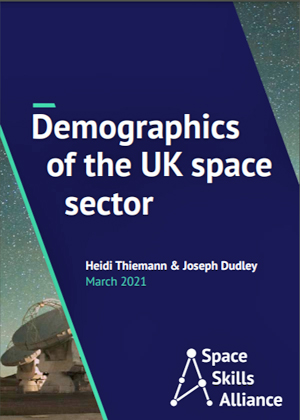
We have gathered a real wealth of data and it will take us some time to analyse in-depth. However, some really interesting top-level stats have been uncovered. For example, we now know that:
- Just 29% of the space sector workforce are women;
- People in the sector are also less likely to be carers (6% rather than 15% in the wider workforce);
- LGBT people are well represented in the sector although a significant proportion of them (~25%) are not comfortable being open about their sexuality or gender;
- Also, ethnic minorities are under-represented, especially in industry and in government.
There are clearly EDI challenges in our sector, and the Census has been invaluable in helping us understand where those challenges lie. The team will now digest these results and engage with other organisations to introduce practical recommendations and actions that will hopefully lead to significant improvements.
The importance of being able to bring your whole self to work
Equity, diversity and inclusion is so important for a number of reasons. Firstly, and most importantly, it’s just the right thing to do. Secondly, and often most usefully when trying to convince people to take this stuff seriously, it also makes for better business! It results in better profit for companies, boards perform better when they are more diverse, and better decisions are taken.
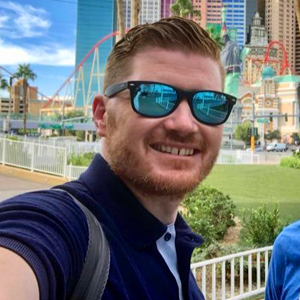
On my first day at the European Space Agency I was asked by one of my new colleagues if I had a girlfriend, I said no, and told her I was gay. She smiled, said she was fine with that, but I shouldn’t tell anyone else at work because it would possibly ruin my career. I was surprised, and that single conversation shoved me back into that closet from a career perspective. I have spent a significant proportion of my career hiding that part of my personality and know full-well what it means to not be your authentic self in the workplace.
What we mean by ‘intersectionality’
None of the diversity categories are discrete and separate from each other. They intersect. In reality, many people will fall into multiple categories and there are an infinite number of life experiences that we try to capture when partitioning EDI as we do. Life isn’t neat and ordered into EDI categories and to treat diversity in a non-intersectional way would be an oversimplification that would hamper our attempt to improve our sector.
For example, an interesting category that is often common to a number of equity challenges is socioeconomic background. It can often be seen in conjunction with other areas of disadvantage but is often one of the least addressed elements of inequality in the skills pipeline from an industry perspective.
We know from our census that privately educated people are overrepresented in the space sector, more than double the national average. Could this be a major contributor to the lack of diversity across other categories too?
Being an ally for female colleagues
While men make up the majority of our industry, and especially the majority of hiring management, it’s super important that there are men fighting for EDI. As many men as possible should be equipped to spot gender (and other) biases in themselves and others, and should hopefully feel empowered to call out other men and women in the workplace when they see examples of it. EDI is an everyone issue.
Coming up next
It’s an exciting time to be working at SatixFy, with new products launching and the company expected to grow rapidly over the next 12 months. Outside of my day-to-day job, I’m also working with others on the programme committee for the 2021 UK Space Conference. It will be online for the first time which gives us a real opportunity to reach a different and more diverse audience. I’m going to work hard to make this the most diverse conference we’ve had to date.
And of course, I’ll be working on the next stages of our sector EDI programme, taking the data we’ve uncovered in the Census and turning that into practical advice for our space industry, academia and government stakeholders. We are due to publish a detailed report on gender in the space sector in the coming months and I’d love to share the results with Womanthology when the time comes!
I agreed to take the role as space sector EDI champion on the condition that I’d be allowed to make a real impact. So far, so good…!
https://www.linkedin.com/in/craigbrownspace

